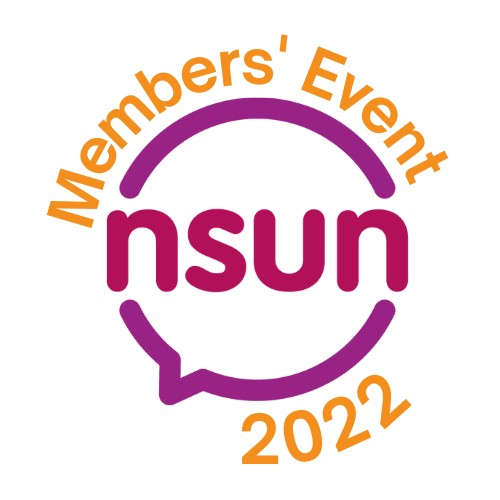Unfortunately due to speaker illness this session is now cancelled. We are looking to rearrange it for sometime soon and will let registrants know as soon as a new date is confirmed.
15th November, 11am-12.30pm
In recent years the term abolition has gained traction in the mainstream as a critique of prisons and policing, but what is it and how does it relate to those in user-led mental health spaces?
User-led groups are often challenging the way those experiencing mental ill health, distress and trauma are denied access to fulfilling and affirming mental health care. They also expose how people can experience harm when they do seek mental health support and can be subjected to violent encounters with the police and prison system in the process, all in the name of ‘care’.
Here, we’ll unpack how mental health care can replicate carceral systems, the historical connections between mental health institutions and prisons, and why abolition has and can provide some of the solutions to these harms.
Synergi, which is hosted by NSUN, is a project that will look at mental health and racial justice through an abolitionist lens. Join us for our first public event as we introduce Synergi and explore some of the core concerns of our work.
In this discussion, we will hear about how people are bringing abolitionist principles to providing care and practical support to those experiencing mental ill-health, distress and trauma. There will be space to discuss and ask questions to our guests.
Chair: Alaina Heath, Hosted Projects Coordinator at NSUN (with introduction to Synergi from Jilna Shah)
Guests: Kelsey from Cradle Community and Micha Frazer-Carroll
Please scroll past the additional session information and speaker bios below to view the resource list for this session.
Session information
- This session will have British Sign Language interpretation and closed captions. Please let us know of any other accessibility requirements in the sign up form.
- This session will be recorded. For more information about this, please visit the Data page.
- We ask that attendees agree to the principles of our group agreement to keep the space as safe as possible for everyone.

Kelsey (she/her) from Cradle Community
Cradle is an abolitionist collective creating spaces to explore and learn the skills we need to build transformative justice and community accountability in our communities. They run workshops on the practical and relational skills we need to transform the world and ourselves, such as bystander intervention and building and rebuilding trust. Last year they released a book about abolitionist resistance across Britain and beyond called Brick by Brick: How We Build a World Without Prisons published by Hajar Press.
Twitter: @cradlecommunity

Micha Frazer-Carroll (she/her)
Micha is a writer and editor from London.
She is currently writing a book on the politics of mental health for Pluto Press.
Her work centres around the theme of liberation. She is most interested in the politics of race, gender and disability, and how they interact with culture.
Twitter: @micha_frazer

Alaina Heath (she/her)
Alaina is the Hosted Projects Coordinator at NSUN, facilitating and supporting NSUN’s hosting of Synergi, Misery and North East Together.
Alaina is based in Leeds and has a background in supporting community organizations working to challenge discrimination and nurture racial and cultural equity. She is currently finishing her Masters in Race and Resistance where she is researching grassroots organizing of Black and ethnic minority women against the injustices of carceral and psychiatric institutions.

Jilna Shah (she/her)
Jilna will introduce Synergi at the start of this session.
Jilna is the co-Director of Synergi, a programme of work which focuses on the intersection of racial justice and mental health. She shares this role with Lena Mohamed.
Jilna has worked in the UK and in India on issues of rights and justice. In India she worked alongside Dalit and Adivasi people’s movements and learnt a lot about grassroots organising, and the links between consciousness change and wider political change. In the UK, Jilna has worked on migrants’ rights issues in different capacities, from managing projects aimed at collectivising migrants’ rights advocacy to leading a small organisation in embedding intersectionality into how they work.
Resource list
This resource list has sources in different formats that explore abolition, mental ill-health and racial justice. It is not at all compulsory to look at these before the session, but we know that resources can be helpful for background and to refer back to. Please just look at whatever you’re interested in😊
Bitesize resources:
- A world without prisons – Abolitionist Futures: introduction to abolition (video)
- Posters for imagining abolitionist alternatives – Abolitionist Futures
- Defund the police: Reformist Reforms vs Abolitionist Steps for UK policing – Abolitionist Futures (chart)
Artwork:
- Community — Molly Costello Art & Design
- Working on Our Power: Activist Work Books (2020 -) – Jacob V Joyce (radiant-minds.co.uk)
Music:
Articles:
From a UK perspective, Steffan Blayney challenges the argument for the reallocation of funding from police budgets into mental health services as a solution to police brutality and institutional racism. Steffan discusses how mental health institutions replicate carceral systems of harm and racism and, therefore, need to be included in abolitionist critique and practice.
From a US perspective, Stella Akua Mensah outlines how psychiatric practice has been used to detain and punish those who diverge from a status quo that is white, patriarchal, and enamored with respectability and compliance with the state’s self-serving notions of “normalcy.” In order to move away from this ‘prison culture’, Stella discusses alternative approaches to harm reduction and care such as restorative and transformative justice and indigenous practices.
NSUN’s abolition and mental health series is made up of four blog posts. This includes ‘Policing, Morality and Mental Health’, ‘Abolition of State Power, Regardless of the Uniform’, ‘Eating Disorder Treatment is Broken, and Only Abolition Can Fix it’ and ‘Abolitionist Medicine: Dismantling Carceral Logics in Healthcare’.

